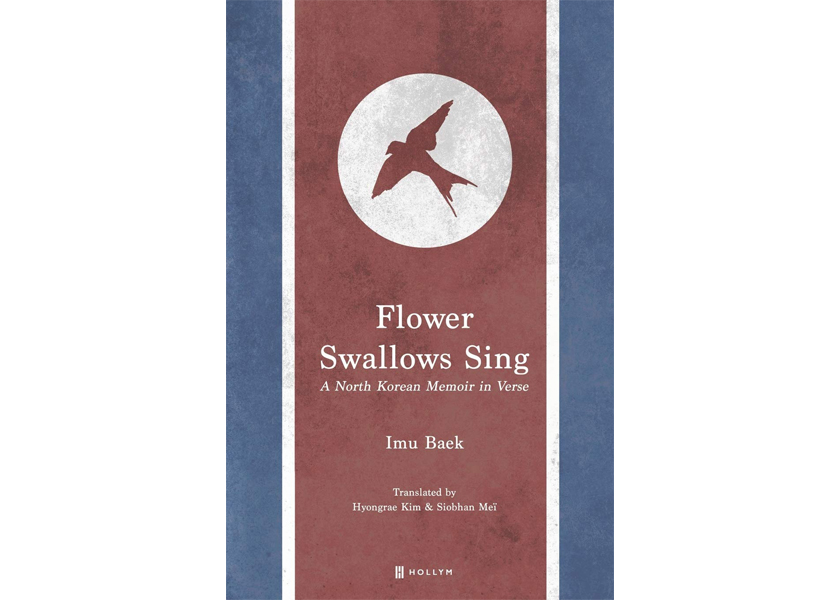FLower Swallows Sing: A North Korean Memoir in Verse ~ By Imu Baek
(Hollym, Carlsbad (CA), 2020, ISBN #978-1-5659-1381-1)
Review by John Feffer (Spring 2021 issue)

In the late 1950s, when he was in prison and expecting to be executed, the South Korean poet Ko Un vowed that if he lived, he would write a poem about every person that he’d ever met. This monumental project, Ten Thousand Lives, grew to 30 volumes. In memorializing people who might otherwise be forgotten by those outside their immediate families, Ko Un also details the sacrifices that so many Koreans made to create the modern democracy of today.
Imu Baek has done something similar for North Korea. Although she titles her collection of verses a “memoir,” it is really a memorial to all those who did not survive the famine that swept through her country during the 1990s. Like Ko Un, she came close to death herself after her parents died and she lived as a homeless orphan. She was lucky enough to escape across the border to China and now lives in South Korea.
But Baek hasn’t forgotten what she left behind. She writes:
I will keep the promise we made that day
I will recall the days of suffering we endured
I will call to mind each of your faces
As I document your names in this book
A record of our lives together
The lives she is recording are those of the “flower swallows.” According to a helpful note from translators Hyongrae Kim and Siobhan Mei, the expression derives from the Russian word for nomadic, kochevoy. In Korean, that became kot (flower) and jebi (swallow). Just as there is no such thing in nature as a “flower swallow,” there was nothing natural about a horde of ragged children trying to survive on discarded and purloined food in a country where even Party members in good standing were starving to death.
The short poems in Flower Swallows Sing are full of horrors. The hungry range across the land like locusts eating everything in their path including grass and tree bark. Those who protest are “beaten, burned, stabbed, and shot.” The corpses that pile up everywhere provide a brief feast for vultures and crows. The truly desperate resort to cannibalism.
In keeping with the central conceit of nomadic children as birds, Paek tries to convey the surrealism of this “arduous march” period by deploying the folk tradition of enlisting animals as narrators. A cat flees before it can be eaten, sheep patiently await their fate, oxen dumbly labor under the plow, and weasels sneak out of their tunnels to steal food. The famine stripped people of their humanity, and even the innocent were reduced to the level of wild animals. The flower swallows, too, don’t have a choice but to forage for food that people ordinarily don’t touch.
they munch on dragonflies
and snack on tired butterflies
leaping grasshoppers and jumping frogs
dead snakes, sickly rats, chirping chicks
all can be eaten
Baek reserves her harshest criticism for the government that presides over this horror show. The leaders are not just cruel monsters. They are worse than the Japanese colonizers, which is possibly the worst comparison anyone can make in North Korea.
it was better under the Japanese,
at least we had food on the table.
now we starve to death
the elderly mutter
these risky words
when they think no one is listening
To drive home the point of government complicity, a number of poems contrast North Korean propaganda of the government with the reality on the ground. The leaders boast that North Korea is the “greatest country in the world” yet the flower swallows go hungry. Prison camp children are, according to the government, “lazy bums” who “have committed so many crimes are such a young age.”
we don’t have cloth
to make you uniforms
it would be a waste anyway –
work as you are
then die
Flower Swallows Sing is a devastating indictment of a state that has failed so many of its citizenry.
For all the power of individual poems, the collection is uneven. There is much repetition of imagery, for instance three poems comparing flower swallows to weasels, several similar-sounding prayers in verse, a number of poems devoted to rejoining parents in heaven, and so on. Perhaps the poet wants to convey the numbing sameness of life on the margins in North Korea, but the result feels rote at times.
Indeed, there can be such a frustrating lack of detail about the people who have died that when the narrator describes her father late in the book – “my own dear father was an angry drunk/when it was all too much/he’d resort to rubbing alcohol/and his rage would hail down upon us” – the words practically jump off the page in their horrifying specificity.
As a memoir, Flower Swallows Sing doesn’t tell us much about the specific plight of Imu Baek, a poet who received awards as a young woman from the North Korean state only to face near death as a flower swallow during the famine years. Unlike Ten Thousand Lives, it doesn’t capture the idiosyncratic personalities of the people she met during those terrible days. But as a memorial to an underclass of miserable children whose very existence belied the government’s cheery propaganda, Imu Baek’s poems are a wrenching collective portrait of those who are no longer here to tell their own stories.


